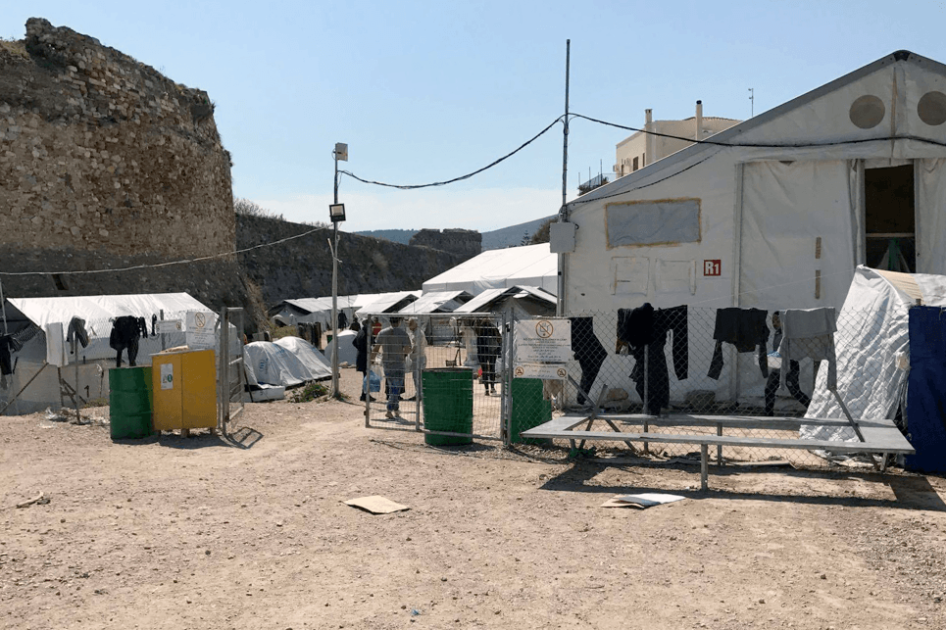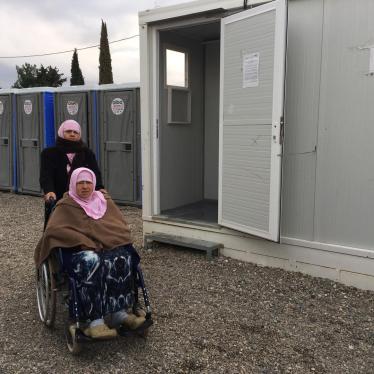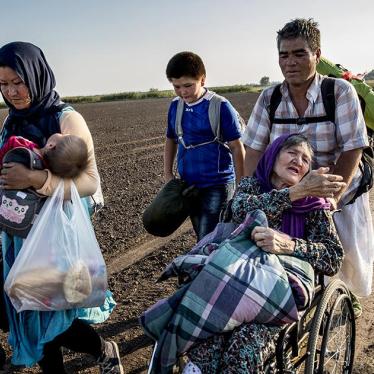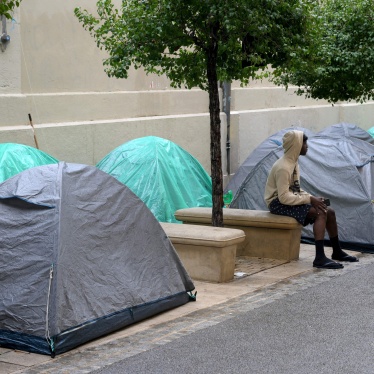(Brussels) – The EU-Turkey deal designed to stem migration and refugee flows to Greece has had a devastating impact on the mental well-being of thousands of women, men, and children trapped on Greek islands since March 2016, Human Rights Watch said today.
In research conducted in May and June 2017 on the island of Lesbos, Human Rights Watch documented the deteriorating mental health of asylum seekers and migrants – including incidents of self-harm, suicide attempts, aggression, anxiety, and depression – caused by the Greek policy of “containing” them on islands, often in horrifying conditions, to facilitate speedy processing and return to Turkey.
“The psychological impact of years of conflict, exacerbated by harsh conditions on the Greek islands and the uncertainty of inhumane policies, may not be as visible as physical wounds, but is no less life-threatening,” said Emina Ćerimović, disability rights researcher at Human Rights Watch. “The European Union and Greece should take immediate action to address this silent crisis and prevent further harm.”
Thousands of asylum seekers, including women and children, are trapped in worsening conditions in EU-sponsored processing centers – so-called hotspots – and other facilities, amid an ongoing flow of new arrivals and slow decision-making on the part of the Greek government. In December 2016, the EU and the Greek authorities ended exemptions for vulnerable groups protected by Greek law from the requirement to remain on the islands.
The EU-Turkey deal, signed in March 2016, commits Turkey to accept the return from Greece of most asylum seekers who traveled through its territory and arrived on the Greek islands, in exchange for billions of euro in aid, visa liberalization for Turkish citizens, and revived negotiations for Turkish accession to the EU.
Human Rights Watch met in Greece with representatives from the United Nations refugee agency (UNHCR), International Organization for Migration (IOM), European Commission, Greek Asylum Service, local and international nongovernmental organizations (including disabled persons organizations and aid organizations), lawyers, and volunteers. Human Rights Watch also interviewed 37 refugees, asylum seekers, and other migrants on Lesbos, including unaccompanied migrant children. The vast majority of interviewees described the deteriorating mental health among asylum seekers and other migrants trapped on Greek islands.
“Camps are places where vulnerabilities are created,” one IOM official said.
Médecins Sans Frontières (MSF), which provides medical care on the islands of Samos and Lesbos, reported a high prevalence of depression, anxiety, and psychosis, and a significant increase in suicide attempts and incidents of self-harm, particularly since January 2017.
The trauma of war or forcibly leaving homes is enough to trigger anxiety and post-traumatic stress disorder (PTSD) in asylum seekers and migrants. But medical personnel interviewed said that mental health of asylum seekers and migrants has been impacted by factors related to the EU-Turkey deal. These include insecurity; harsh camp conditions; lack of access to services and information about the asylum process and their prospects for the future; delays in the asylum procedure; detention and fears of being detained and deported to Turkey; and feelings of hopelessness.
Rabiha Hadji, a 33-year-old Kurdish mother of four children from Syria who was detained at the Moria hotspot on Lesbos, was refused asylum protection in Greece on the basis that Turkey is a safe third country for her and her family. “My hope is dead since they brought me here,” she said. “We saw all the terrible miseries [in Syria] but me and my children haven’t seen a jail [until coming to Greece].” She was awaiting deportation to Turkey.
An EU official in Athens confirmed the negative impact that prolonged uncertainty has had on people’s mental health on the islands. Asked what steps the EU will take to address the issue, the official said the aim is to speed up the asylum process and to increase returns to Turkey in a timely manner, thus preventing people from being trapped on the islands for longer than needed.
While length of the asylum procedure is one factor contributing to people’s distress, speeding up the process could undermine the effective exercise of asylum seekers’ rights. The length of asylum procedures should not be reduced at the expense of the quality of the process. Human Rights Watch has documented cases since the EU-Turkey agreement entered into force in which there were no interpreters, or inadequate ones, during asylum and admissibility interviews and serious gaps in access to information and legal assistance.
Registration and examination of asylum claims on the islands are prioritized based on nationality, resulting in severe delays for people of some nationalities, including for people from Afghanistan and Iraq. Asylum seekers from countries with a relatively low claim recognition rate, such as Algeria and Morocco, are often detained because Greek authorities allege that they apply for asylum merely to delay or frustrate returns to Turkey, raising concerns about the use of arbitrary detention based on nationality.
This differential treatment, and frustration at delayed procedures, has led to unrest in the hotspots and island detention facilities and psychological distress, Human Rights Watch found.
Greek authorities, with EU support, should ensure asylum seekers have meaningful access to a fair and efficient asylum procedure based on individual claims, not nationality. Asylum seekers should be admitted so that their claims for protection can be examined on their merits in Greece. The EU and the Greek government should work together to ensure that people receive timely and accessible information in a language they understand.
In addition, the Greek government should end the containment policy on the islands, including for at-risk groups, and, with EU and UNHCR support, transfer asylum seekers to the mainland and provide them with adequate accommodation. The Greek government should also enroll all children in schools, and provide adults with work visas and an opportunity to work.
“The European Union and the Greek government should work to restore the dignity and humanity of people seeking protection, not foster conditions that cause psychological harm,” Ćerimović said.
Inhumane Policies
The EU-Turkey deal aims to return most asylum seekers from the Greek islands to Turkey under the flawed assumption that Turkey is a safe country for asylum seekers, without considering the merits of their asylum claims in Greece. Since the deal entered into effect on March 20, 2016, tens of thousands of people have been bottle-necked in deplorable and volatile conditions on Greek islands. According to governmental figures published by UNHCR, 12,873 asylum seekers are currently on the Greek islands. Thousands of them are living in extremely harsh conditions in overcrowded facilities while their protection claims are being processed.
An Action Plan between the European Commission and the Greek government published in December 2016 recommended that Greece take tougher measures aimed at increasing the number of returns to Turkey. Those measures included ending exemptions for vulnerable groups and people eligible for family reunification from the requirement to remain on the islands and requiring them to go through a fast-track admissibility process. The commission also recommended expanding detention on the islands and curbing appeal rights.
The Greek government is already carrying out some of these measures, including by increasing detention capacity, and by containing people identified as “vulnerable” on the islands until the first instance examination of their asylum claim under the regular procedure. In April, the government adopted a policy excluding asylum-seekers on the Greek islands who appeal negative asylum decisions from the possibility of participating later in the IOM Assisted Voluntary Return and Reintegration (AVRR) programme, which offers voluntary returns to the home countries of asylum seekers, and forcing those who wish to participate to forego their right to appeal.
In May 2017, Human Rights Watch documented that the EU is inappropriately pressing Greek authorities and medical aid organizations to reduce the number of asylum seekers identified as “vulnerable,” including people with disabilities, torture victims, and other at-risk groups. As a result of not being identified, at-risk people struggle to get the protection and assistance to which they have a legal right.
Factors Causing Psychological Distress
Insecurity and Uncertainty
The insecurity in the camps and uncertain futures, including when the first asylum interview will take place or when the decision will be made, have increased the risk of distress among asylum seekers trapped on the Greek islands.
Nakibullah, a 16-year-old boy from Afghanistan, said: “I’ve been here for 10 months and I am worried about what will happen…. I am not well mentally because I live in insecurity.”
“Hamid,” an 18-year-old Bangladeshi stranded on Lesbos since November 2016, said, “It’s been a while that I live here and every day that passes is worse…. My biggest stress is about what will happen the next day. What tomorrow will bring. Why are you keeping me here?”
Detention and the risk of deportation to Turkey is another catalyst for anxiety, depression, or self-harm. “This is especially the case since [increased] detention and deportations became a reality in the last few weeks,” a lawyer on Lesbos told Human Rights Watch in May. Twenty-two people were deported back to Turkey the week before Human Rights Watch’s visit to Lesbos on May 18. A total of 1,210 people had been returned back to Turkey by June 13, since the deal entered into force in March 2016.
Greek authorities transferred “Ahmad,” a 20-year-old Syrian, in May 2017 from Chios island, where he had lived since August 2016, to the Moria pre-removal detention center on Lesbos. “We came here and we don’t know if we are going back to Turkey or whether we are going back to Chios,” he said. “I’m in a nervous situation. Being between [other detainees] makes me nervous. Yesterday, an Algerian guy hurt himself…. My feelings are dead.” Two other people in separate interviews confirmed that an Algerian man had harmed himself by cutting.
In response to EU prodding, Greece is taking some steps to speed up the asylum process. Authorities recently started to apply a fast-track procedure provided for in a Greek law adopted in April 2016 that entails examining the admissibility or eligibility of international protection claims within 15 days, including appeal.
“More frequently, new arrivals have their interviews scheduled in the first five days of their arrival,” said Lorraine Leete, a lawyer from the Lesbos Legal Centre, which provides legal advice to asylum seekers and other migrants on Lesbos. “They are not given adequate time to prepare for interviews or meet with the lawyers.”
MSF said that it takes time and expertise for experiences of abuse, torture, or persecution to come to light. Reducing the length of asylum procedure should go hand in hand with an improved capacity to detect people’s “vulnerabilities” while maintaining their right to appeal.
Harsh Camp Conditions
Extremely bad living conditions in overcrowded hotspots with little to no access to services is another key factor that contributes to deteriorated mental health. An MSF representative said that on Samos, they see more and more refugees intentionally harming themselves.
“Imran,” a 15-year-old boy from Afghanistan who lived for more than 10 months in overcrowded and volatile conditions at Moria, said:
I’ve been 10 months here [on Lesbos] and the situation is very difficult. I am not well at all here. I have ‘psychological problems’ that I also had in Afghanistan. During my time here, they have worsened because I live under these conditions. I’ve reached a point where I harmed myself three times. Now, I [get counseling and] am on medication.… I also have pain in my stomach. It hurts. I don’t sleep much. I don’t fall asleep easily. I might fall asleep at 3 or 4 in the morning and wake up by 8. I feel awake all the time. I don’t have an appetite and energy.
An MSF representative said that poor conditions in hotspots are especially harmful to people with mental health conditions or torture victims: “For persons who have experienced extreme violence in detention back in their countries of origin, a place surrounded by barbed wire, the presence of police, and violent clashes clearly cannot be a proper place for them.”
Amir, a 26-year-old asylum seeker from Iran who has been detained on Lesbos since mid-April, including for 20 days at a police station cell, said: “I am not good because in Iran I was in a military prison and while I’m here I see the fences and I remember my past […] During the first week I was here, I couldn’t sleep all week […] I had nightmares of the torture I’ve been through in the military prison.”
“Halid,” a 16-year-old boy from Afghanistan who has been living in Moria since December 2016, said harsh camp conditions, uncertainty, and fear of deportation exacerbated psychological distress he felt while in Afghanistan:
When I first came here it was very hard because I didn’t know anyone. Now I see a psychologist. I speak, and I feel a bit better. Back in Afghanistan I did not feel well with everything that happened. Here, the conditions didn’t help. And now, the fact that I don’t know what will happen in the future also makes me not feel well. I am afraid of being deported.
The hotspots were originally designed as registration and transit centers where people were supposed to stay for short periods, not as places of indefinite containment.
An MSF representative said that the treatment of refugees, including being contained on the islands and in camps, not only exacerbates existing mental health conditions but also creates new psychological distress:
There are many people with PTSD, due to violence they have experienced in their home countries or because of trauma they have experienced during the treacherous journey, but the uncertainty of what is going to happen and the living conditions on the island [Lesbos and Samos] further exacerbates the symptoms and creates new mental health conditions. We have new cases of people with anxiety, depression, self-harm, and more people will most likely develop new forms of mental health conditions due to the conditions on the islands.
“Bilal,” a 26-year-old asylum seeker from Syria with a mental health condition, has been detained on Lesbos for more than three months pending return to Turkey. He said he was held for more than two months at a police station cell, where he said he attempted suicide, before being moved to Moria. “All this time [at the police station] I had seen no doctor,” he said. “Then I hurt myself in the police station, and then they [the police] brought me here [to Moria].”
“Anush,” a boy from Afghanistan who was registered by Greek authorities as 20 but says he is 16 and is living with the general population in Moria since the end of August 2016, said:
I feel very bad. Whatever you do, even if you change it [Moria], it is not a place to be. Psychologically I feel very bad. I go to a psychologist and a psychiatrist, every week for a month now. It helps but when you live in Moria it doesn’t help. From the moment I got here, my psychological well-being got worse because of all the situation and whatever happens in Moria. We came here because of a better life but there are lots of problems.
An NGO worker following Anush’s case added: “[He] has lots of psychological ‘problems’. We visited a psychiatrist, we visited a neurologist but as he says, if the conditions don’t change, this doesn’t help. He has lots of anxiety and at least one panic attack per day. His fingers are trembling and he has severe headaches.”
Discriminatory EU and Greek Policies
The discriminatory policy adopted by Greece that is based on nationality, not individual cases, is another source of mental anguish. An MSF representative said:
The procedure is different for nationalities of applicants within the recognition rate [granted protection] below 20 percent. Such discriminatory procedure is not comprehensible. The person rightly believes that their case should be assessed on the basis of their individual claim, not their nationality, but that is not happening on the islands. The system completely destroys the dignity of people.
Asylum Process Stress
Two lawyers providing legal advice to asylum seekers on Lesbos said that the Greek Asylum Service (GAS) has taken some steps to schedule interviews and issue written notices for dates that, if kept, would allow for relatively prompt consideration of claims, but it has not been consistent in keeping those appointments.
For example, the interview for “Anar,” a 27-year-old man from Afghanistan, has been postponed without explanation at least 5 times during the 10 months he has lived in Moria. “It’s made me ‘crazy,’” Anar said. “When I think of the person I was 10 months ago when I first arrived and the person I am today, it’s not the same person.”
Leete, the lawyer providing legal advice to Anar and other asylum seekers on Lesbos, confirmed that Anar’s first interview was postponed without explanation. Leete added that Anar’s experience is not unusual. “Many go there regularly on the scheduled day of the appointment, wait for hours, only to be told to come instead another day,” Leete said. She added that Rohingya from Myanmar, who had been on Lesbos for nine months at the time of our interview, in mid-May, are repeatedly given new dates, because the asylum service says it cannot get interpreters.
Many people also fear having their asylum claim rejected. A member of a Syrian Kurdish family of five who were rejected on both first and second instance hearings said:
We got rejected twice. We were in Kara Tepe [open camp on Lesbos] one month ago. My husband went to renew the [asylum] application card. He went inside the asylum office and the police arrested him. The police then came to my room, inside Kara Tepe and brought us here [Moria]. They didn’t even let us take our stuff. Later the police brought our stuff. For four days I didn’t eat at all, I went on a hunger strike. And they took me to a hospital.
One of the lawyers interviewed and a representative of MSF confirmed that the family had been denied full examination of their claim in Greece on the basis that Turkey is a safe third country for them, and has been detained in a closed compound inside Moria since April 28. A family member said:
When we arrived here first, the lawyer told us, ‘You will get out in 10 days.’ But, we don’t know how long we are going to stay here. They should tell us. Is it two months, three months? If you killed someone the court would say, ‘you are going to be in jail for six years.’ But to us, they don’t say anything.
Leete said that one of the biggest tragedies of the declining mental health of refugees in Greece is that people who have a right to international protection and who are refugees under EU and Greek law are in fact being denied protection:
Many people have given up and are volunteering to go back to their home countries. They came to Europe seeking safety, they are not finding it here, and are instead trapped on the islands. They don’t know if they will be allowed to stay, or returned back. Will they be rejected as other people who have had valid claims? That’s the biggest tragedy: the system has come to the stage where people ‘volunteer’ to go back to the countries where their lives might be in danger. And when I say ‘volunteer’ that should be put in a quote as I think it is a forced departure. Everyone who came to Greece, and decided to risk their lives, came here for a reason.
A representative of Doctors of the World (MDM), an international organization which operated in Moria until end of June 2017, said: “Not only are we not meeting their needs, but [the system] is doing more harm.”
The feeling of helplessness and lack of activities are other factors that influence people’s mental health. “They have fought for months, nothing has changed,” an MSF representative said. “It is also the feeling of not being able to change anything, of not having anything to do, the feeling of hopelessness and uselessness.”
Nakibullah, the 16-year-old boy from Afghanistan who has been trapped on Lesbos for 10 months, said: “I am losing my time here…. Here time goes by without anything happening.”








